
e-Newsletter
Volume Eleven, Issue Ten
4/21/04
Volume 11, Issue 10
"DECEPTION IN THE CHURCH" e-Newsletter
4/21/04
Dear All,
Greetings in the name of the Lord Jesus Christ!
FEATURE ARTICLE
The feature article in this DITC e-Newletter edition is “Cross
Over To The Otherside” by Orrel Steincamp, The Plumbline, Volume
9, No. 2, March/April. This article exposes the postmodern new paradigm
of the church growth movement. It shows just how unbiblical it is
and how it got that way.
Catch This
Limited Time Offer!
We have some special items in limited stock priced low to sell. Hurry
because we will undoubtedly run out of these special sale items.
PayPal purchases for items that have run out will be refunded through PayPal.
Mail orders will not be accepted for these specials.
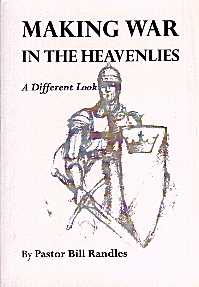 |
Making War In The Heavenlies
by Bill Randles
US
$10.00+$4.00 S/H =$9.00 each
Non-US
$10.00+$10.00 S/H =$10.00 each
|
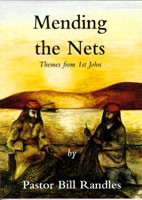 |
Mending The Nets
by Bill Randles
US
$10.00+$4.00 S/H =$9.00 each
Non-US
$10.00+$10.00 S/H =$10.00 each
|
 |
Beware The New Prophets
by Bill Randles
US
$10.00+$4.00 S/H =$9.00 each
Non-US
$10.00+$10.00 S/H =$10.00 each
|
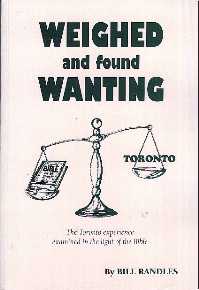 |
Weighed And Found Wanting
by Bill Randles
US
$10.00+$4.00 S/H =$9.00 each
Non-US
$10.00+$10.00 S/H =$10.00 each
|
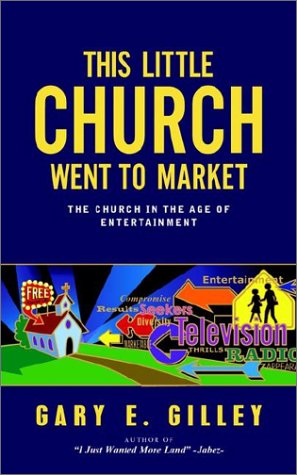 |
This Little Church Went To Market
by Gary Gilley
$10.00+$4.00 S/H =$9.00 each
Non-US
$10.00+$10.00 S/H =$10.00 each
|
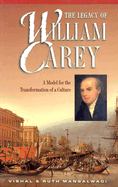 |
The Legacy Of William Carey
by Vishal & Ruth Mangalwadi
US
$10.00+$4.00 S/H =$9.00 each
Non-US
$10.00+$10.00 S/H =$10.00 each
|
 |
More Than A Carpenter
by Josh McDowell
$10.00+$4.00 S/H =$9.00 each
Non-US
$10.00+$10.00 S/H =$10.00 each
|
Check It Out!
BOOK REVIEWS
PAGE
Check out our Book
Reviews page on DITC. It is an alphabetical directory of
book, video, newsletter and course reviews by title. This is a handy
research guide of reviews by the best apologist authors. Check the
What's
New! page at DITC often for new book reviews. We also have
a number of new reviews online in Book Reviews on "The
Passion" by Mel Gibson.
Excellent Resources!
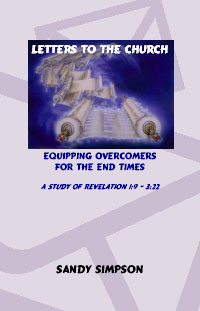 |
Timely!
LETTERS TO THE CHURCH is a fitting
manual for the Revelation Christian. All the precepts are in the seven
letters in Revelation 1:9 - 3:22 to help us keep the faith, stay in sound
doctrine, and reach out to those who are perishing. I hope and pray that
this book will help the reader to be an “overcomer”.
Go here
for more details and how to order!
|
 |
Demolish Arguments!
Want to be able to see your way through to clear biblical discernment?
Want a set of tools that will allow you to disciple your loved ones so
they will stand firm in the Faith? Want to sort out many of the false arguments
and teachings that have invaded the churches? Then
DISCERNMENT
TOOLKIT is for you!
Go here
for more details and how to order!
|
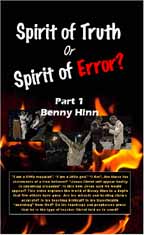 |
This Is THE Benny Hinn
Video!
SPIRIT OF TRUTH OR SPIRIT OF ERROR?
PART 1 - BENNY HINN
features Jacob Prasch, Mike Oppenheimer &
Sandy Simpson and tons of video showing the teachings and prophecies of
Benny Hinn. This is a proven tool to keep people away from heresy.
Go here
for more details and how to order!
|
In His hands,
Sandy Simpson
Apologetics Coordination Team (ACT)
“Cross Over To The Otherside”
by Orrel Steincamp, The Plumbline, Volume 9, No. 2, March/April
Otherside, OtherSide, other side (or other variations thereof)--the
term was made familiar within the so-called "emerging church" movement
by the very popular book,
The Church on the Other Side by Brian
McLaren.1 Some in this movement have utilized the term to depict a radical
break with historic evangelical thought and practice. This movement
has spawned a host of managers and change-agents, one of whom is William
(Bill) M. Easum who wrote his own "otherside" book entitled Leadership
on the Otherside.2 In a favorable interview printed in the Assemblies
of God "Enrichment Journal," Easum is introduced as the "president and
senior managing partner in ... a church consulting and futuring firm devoted
to coaching church leaders into the 21st century."3 Easun believes we are
living in what he calls a "crack in history" between the end of the periods
of Christendom and modernity and the beginning of a new era, which will
require a new kind of leadership.
Proponents of postmodern ministry (PPMs) claim that the modern culture,
in place since the Enlightenment in the 18th century, has recently been
completely displaced by a postmodern worldview. Postmodernism is
what Easum means by the crack in history. PPMs insist that evangelical
churches, still mired in the previous "modern" era, must "cross over" the
divide to be recast into a postmodern mold or simply die a natural death.
As Stephen Shields reports, author and pastor Brian McLaren points out
that postmodernism is not anti-modernism and "compares it to post-adolescence.
Post-adolescents have
passed though adolescence and the accomplishments
and lessons of adolescence are assumed..."4
Tony Jones, who views McLaren's books and writings with approval, says:
And books written by pastors and consultants about 'doing church
in a postmodern world' are nothing new, nor are treatments of postmodernism
by Christian academics. Leonard Sweet and Stanley Grenz have garnered
thousands of readers in the pastorate and seminaries. ... McLaren, however,
is saying something much different. He goes beyond promoting a change
in pastoral technique. He's challenging pastors to rethink their
message, not just how they deliver the message. He's not writing
about a change in context, he's writing about changing the content.5
During the modem era, (since the 18th century) Truth was assumed to
exist; it was just waiting to be discovered by rational and thinking persons.
People could debate and disagree about the Truth but there could be only
one Truth. But now "truth" is whatever the individual or community
believes it is. Postmoderns now insist that truth is no longer "over
and above us," that it is something that cannot be conveyed across cultures
and over time. Each community can have its own “truth.” Therefore,
contradiction is not only inevitable, but abounds; contradiction in spirituality
is not only acceptable, but welcome. Augustine's dictum, "All truth
is God's truth" has been altered to mean, "Everybody's truth is God's truth."
It all depends on how you look at it and of what social group you are a
member.
The PPMs promoting an intentional postmodern ministry assume that Postmodernism
has already effected a clean break with the modern era. For PPMs,
the transition from the modern era to the postmodern is a done deal.
It is something like driving to the U.S./Canadian border, the cross-arms
lift, and voila you drive into a new country; the old one is back
there, behind the barrier. But promoters of post-modernism as some
kind of brave new epoch should exercise some restraint. Whatever
this spreading Postmodernism really is, it has barely begun. Is it
not a bit "heady" to announce the dawn of a new age within its first
decade of popular promotion?
R. Albert Mohler, Jr. questions:
Is postmodernism a coherent concept, or is it a phenomenon of popular
intellectual culture - a term to be employed as a code word for the contemporary
and the avant-garde? ... The term is imprecise, irregular, and malleable,
but also highly marketable. It is inserted into book titles, advertising
slogans, and academic course descriptions with abandon. ... Clearly, the
term is intended to mark a break with modernity ... the modern age, however
that is dated.6
So, how do McLaren and others in the "emerging church" movement make
their accommodations with postmodern thought? PPMs most obvious expression
of postmodern thought is in their depreciation of objective truth.
Learning shifts from logic and rational systematic thought to the realm
of experience. In concert with postmodern ideology, the PPMs also
assert that truth is "found" mainly through consensus in community.
Jim Van Yperen is a professional 'intentional interim change pastor'
who is invited to congregations to train them in the 'change process' which
he and other PPMs deem necessary to 'cross over' into the postmodern age.
Yperen himself illustrates the postmodern morph from unchanging objective
truth to 'community truth' within the church. In Barna's book, Leaders
on Leadership,7 Yperen has a chapter called "Conflict: The Refining
Fire of Leadership." Inthis chapter is a section he calls "Affirm Truth
in Community," where he teaches in verypostmodern categories that church
members must pool their thoughts and arrive at a consensus regarding truth.
But if truth is constructed within each congregational community, which
congregation possesses the truth? All of them? Does each have
its own truth? Secular postmoderns solve this difficulty by jettisoning
any final criteria for truth. But how can the church barter away
its unchanging message by relying only on "group-consensus" as the
criteria for truth?
Activist PPMs are attempting to wean evangelicals from their addiction
to the modern era with its dogmatic truth claims by a process called "transformation."
"Transformational thinking" and "managed change" have become the machinery
with which to re-tool the evangelical church. A whole industry of
congregational consultant/coaches are teaching congregations how to be
"transformed" (cross over) into the postmodern worldview in order to make
the changes presumed necessary to impact the 21st century. But how
does one lead evangelicals, born and raised on objective and unalterable
truth, into postmodern thinking? How do change-agent coaches effect
this transformation? They employ a version of belief and behavior
modification using the dialectic (arriving at 'group-consensus') rather
than the didactic (teaching of unchangeable truth claims). The Bible
says:
All Scripture is God-breathed and is useful for teaching, rebuking,
correcting and training in righteousness, so that the man of God may be
thoroughly equipped for every good work." - 1 Timothy 3:16-17 (NIV)
John Stott asserts, "...historic Christianity is essentially dogmatic,
because it purports to be a revealed faith. If the Christian religion
were just a collection of philosophical and ethical ideas of men (like
Hinduism), dogmatism would be entirely out of place."8
But according to PPMs, dogmatism is out of style inside and outside
the church, and 'transformation' and 'managed change' are markers on the
well-traveled road that leads to postmodern, post-evangelical Christianity.
McLaren states:
"Compare modern Christianity's quest for the perfect belief system to
medieval church architecture. Christians in the emerging culture
may look back on our doctrinal structures (statements of faith, systematic
theologies) as we look back on medieval cathedrals: possessing a real beauty
that should be preserved, but now largely vacant, not inhabited or used
much any more, more tourist attraction than holy place. Many of us can't
imagine this. If Christianity isn't the quest for (or defense of) the perfect
belief system ('the church of the last detail') then what's left?
In the emerging culture, I believe it will be "Christianity as a way of
life," or "Christianity as a path of spiritual formation." ... In this
setting, preaching both loses and gains status. Instead of an exercise
in transferring information so that people have a coherent, well-formed
"world view" ... preaching in the emerging culture aims at inspiring
transformation. ... In my hopeful moments I see this new emphasis on
spiritual formation as making possible a convergence. What we might
call post-evangelicals and post-liberals begin finding one another
on this common ground of spiritual formation, welcomed and hosted by our
Catholic and Orthodox sisters and brothers. What is terra nova
for
us has been their native soil for a long, long time."9
Not so fast!! Assuming postmodern thought to be good just because
it is current is dangerous! And, since when does imparting prepositional
truth preclude spiritual transformation in the hearer? Further, postmodern
thinking still is an intellectual novelty--postmoderns don't even believe
it themselves. When they get sick they still check into a "modern"
hospital that employs objective truth procedures for objective diseases.
Because postmodern philosophy is essentially destructive to culture, some
predict that postmodernism will have, at most, a 10-year shelf life (a
mere blink in philosophical history).
The underlying premise of PPM ministry, and seeker-sensitive churches
as well, for that matter, is that the centuries-old Gospel message lacks
sufficient power to attract unbelievers immersed in a postmodern world-view.
Consequently, PPMs feel they have to tinker with the message and adapt
it to postmodern categories in order to succeed in making converts.
But this becomes, in effect, a denial of the Gospel message. The
revealed Gospel is made up of unchanging, dogmatic Truth claims.
Christians have a centuries-old, timeless message that will not share its
glory with any current cultural format, no matter how alluring and demanding
that form may appear to be. "Your word, O Lord, is eternal, it
stands
firm in the heavens." -
Psalm 11 9:89 (NIV)
If the evangelical church pours itself into a postmodern mold, its "Christianity"
will simply dissolve. If the evangelical church discards it's foundation
of objective truth and does not retain the revealed, unchangeable, dogmatic
statements about the nature of God and the way of salvation, it will be
swept up in a vortex of change not unlike the mainline denominations
were at the start of the 20th century. The pure Gospel is always
relevant in any place and at any time. Those who are calling for
evangelicals to have an "affair" with postmodern thinking will wind up
as "washed-up" debris on the theological shore when the next new philosophical
wave comes crashing in. God's Word is ever relevant:
Heaven and earth will pass away, but my words will never pass away.
... For the word of God is living and active. Sharper than any double-edged
sword it penetrates even to dividing soul and spirit, joints and marrow;
it judges the thoughts and attitudes of the heart." - Mark 13:3 and Hebrews
4:2 (NIV)
Because the Gospel, as God's objective revelation, is timeless and always
true, for believers in the Lord Jesus Christ there is no need to "cross
over" to any "other side." As Jude's letter says in verse 3:
“Dear friends ... I felt I had to write and urge you to contend
for the faith that was once for all entrusted to the saints.
---
1 Zondervan, Grand Rapids, 2001.
2 Abingdon Press, Nashville, 2000.
3 “Leadership on the OtherSide" Enrichment Journal: Leadership in the
Local Church, Spring 2002.
4 (http://www.faithmapoes.org/theologyinpomo.htm)
5 (http://www.christianitytoday.com/bc/2002/OO3/16.32.html)("Post-Evangelicalism"
Books & Culture, Christianity Today, May/June 2002)
6 “The Integrity of the Evangelical Tradition and the Challenge of the
Postmodern Paradigm" in The Challenge of Postmodernism: An Evangelical
Engagement, ed. David S. Dockery (Wheaton, Ill.: Victory, 1995, pp.
68-69).
7 Regal Books, Ventura, C.A., 1997, pp. 246-247.
8 John R. W. Stott, Christ the Controversialist. Downers
Grove, IL, IVF, (1970, p. 13.
9
(http://www.christianitytoday.com/ie/2003/003/3.34.html(Leadership
Journal Summer 2OO3)
---
Publishers Note: Following are extended excerpts from Prophetic
Untimeliness: A Challenqe to the Idol of Relevance by Os Guinness (page
#s are noted). His words highlight the contemporary evangelical quest
for, and obsession with, 'relevance.'
---
Never have Christians pursued relevance more strenuously; never have
Christians been more irrelevant. (12) ...
By our uncritical pursuit of relevance we have actually courted irrelevance,
by our breathless chase after relevance without a matching commitment to
faithfulness, we have become not only unfaithful but irrelevant; by our
determined efforts to redefine ourselves in ways that are more compelling
to the modern world than are faithful to Christ, we have lost not only
our identity but our authority and our relevance. Our crying need
is to be faithfull as well relevant.
...Thus for followers of Jesus Christ at this extraordinary moment in
history, it is time to challenge the idol of relevance, and so to become
truly relevant without ever ending up trendy, trivial and unfaithful. (15)
In short, of all the cultures the church has lived in, the modem world
is the most powerful, the most pervasive, and the most pressurizing.
And it has done more damage to Christian integrity and effectiveness than
all the persecutors of the church in history. (51) ...
The first traditional stance of Christians toward the world is, to use
sociologist Peter Berger's helpful category, that of cognitive and cultural
resistance. Taking seriously the biblical warning to "flee the world,"
this first stance is founded on a realistic assessment of the dangers of
the world and of worldliness. It then channels this awareness into
a determined resistance to the spirit and system of the world of its day.
...
What is critical, however, is that the modem world has rendered this
stance largely impotent and almost non-existent. Such is the power,
pervasiveness, and attractiveness of the modem world-in a word, its lure-that
few Christians are willing to think or live decisively "not of' it. A genuine
world-denying stance today is rare. (52)
I can well remember the occasion when this point came home to me for
the first time. My tutor at Oxford, an eminent European scholar,
raised a question at a crowded social sciences seminar in the mid-seventies.
"By the end of the 1970s," he asked, "who will be the worldliest Christians
in America' There was an audible gasp when he eventually answered his own
query: "I guarantee it will be the evangelicals and fundamentalists." (52)
...
The years since the prediction at that Oxford seminar have shown beyond
question that evangelicals and fundamentalists have embraced the modem
world with a passion unrivaled in history. (53) ...
... From a general materialism and secularity in priorities and
preoccupations, to particular captivities to such modem idols as psychology,
management, and marketing, the pattern is starkly plain. The faith-world
of John Wesley, Jonathan Edwards, John Jay, William Wilberforce, Hannah
More, Lord Shaftesbury, Catherine Booth, Hudson Taylor, D.L. Moody, Charles
Spurgeon, Oswald Chambers, Andrew Murray, Carl Henry, and John Stott is
disappearing. In its place a new evangelicalism is arriving in which
therapeutic self-concern overshadows knowing God, spirituality displaces
theology, end-times escapism crowds out day-to-day discipleship, marketing
triumphs over mission, references to opinion polls outweigh reliance on
biblical exposition, concerns for power and relevance are more obvious
than concern for piety and faithfuls, talk of reinventing the church has
replaced prayer for revival, and the characteristic evangelical passion
for missionary enterprise is overpowered by the all consuming drive
to sustain the multiple business empires of the booming evangelical subculture.
Many evangelicals are blind to the sea change because they know only
the present and have little sense of history, even their own. Where
there is a vague awareness that the old views of worldliness have gone,
it is characteristically covered by resorting to the "fallacy of the fear."
That is, a fear of one extreme is cited to excuse the collapse into another.
"Thank God," our new evangelicals say, "that we have escaped from the 'do's
and don'ts' and 'no-nos' of the narrow worldliness of the previous generation.
Our forefathers were hidebound and legalists. They ... reduced worldliness
to drinking, dancing, and smoking. Let's escape from such restrictive
worldliness and celebrate grace and our Christian freedom.' (54-55) ...
The second traditional stance of Christians toward the world is that
of cognitive and cultural negotiation. Taking seriously the
biblical admonition to be "not conformed to the world, but transformed
by the renewing of the mind," this stance is the middle one of the three.
It seeks to maintain an ongoing practice of discerning between true and
false, good and bad, the godly and the worldly. (55) ... But there is a
very practical problem in pursuing this stance today: The modem world makes
it harder than ever. Such is the scale and speed of the information
and the issues we currently confront that our powers of discernment and
discrimination are taxed to exhaustion. (55-56) ...
The third traditional stance of Christians toward the world is the one
most distorted by the pressures of the modem time. This is the stance
of cognitive and cultural adaptation It takes seriously the biblical
call to mission, and in particular the pattern of the incarnation and the
example of the Apostle Paul of being "a Jew to the Jews, a gentile
to the gentiles, and all things to all people." In doing so this stance
seeks to adapt the gospel creatively to every new people and culture so
as to be relevant to the world of its day. (56) The impulse behind this
third stance is admirable. ... But there is a huge pitfall when this stance
is pushed to the limit. And the central force of the modem world
is to ensure that it always goes to the extreme. For the end of the
line in adopting a mode of uncritical adaptation is a reaching out for
relevance that ends up toppling over into surrender to the modem world,
therefore becoming unfaithful to Christ.
How does this collapse into worldliness happen? Both the process
and the problems it creates can be spelled out clearly. A stance
that starts out commendably with a passion for relevance moves through
four steps to end disastrously in unfaithfulness and irrelevance.
Let's examine each of the steps below. (57)
Step One: Assumption
The process of uncritical adaptation begin when some aspect of modem
thought or life is assumed either to be significant, and therefore word,
acknowledging, or superior to what Christians know or do, and therefore
worth adopting. Soon the assumption in question becomes and integral
part of Christian thought and practice. Since all truth is God's
truth, there is an immediate plausibility to this idea.
The danger comes, however, when, an assumption is accepted without any
thought--simply because it is modem. (57)
Step Two. Abandonment
Everything that does not fit in with the new assumption (made in step
one) either is cut out deliberately or is slowly relegated to a limbo of
neglect. ...
What happens in this step is more drastic. Truths or customs that
do not fit in with the modem assumption are put up in the creedal attic
to collect dust. They are of no more use. The modification
or removal of offending assumptions is permanent. What begins as
question of tactics escalates to a question of truth; apparently, the modem
assumptions are authoritative. Is the traditional idea unfashionable,
superfluous, or just plain wrong? No matter. It doesn't fit
in, so it has to go.
In the arena of faith, the modem phase of this trend began in the eighteenth
century, but the liberal heyday for abandoning tradition was the 1960s.
(58) ...
In the 1980s and 1990s, it was the evangelical turn. Regardless
of the fact that Protestant liberalism had chased every idea with skirts
and lost its character, credibility, and national authority in the process,
evangelicals set off on the same promiscuous spree. Suddenly the
air in evangelical conferences and magazines was thick with assaults on
the irrelevance of history, the outdatedness of traditional hymns and music,
the uprightness of traditional moralism,
the abstractness of theologizing,
the impracticality of biblical exposition, the inadequacy of small churches,
and the deadly, new unforgivable sin-irrelevance. (59)
What had happened? The new evangelicals were in the process of
becoming the old liberals. Church growth was now to be "on new grounds."
Modem assumptions from the spheres of management, marketing, and psychology
had become accept ed without challenge.
... In other words, in swapping psychology for theology in their preaching
and enthroning management and marketing in their church administration,
evangelicals were making the same errors as liberals had earlier.
Whatever the newly sharpened statements about biblical authority, the real
authority of the Bible had been eclipsed in practice by the assumptions
of the modem world. (59-60)
Step Three: Adaptation
The third step follows logically from the second, just as the second
does from the first. Something new is assumed; something old is abandoned;
and everything else is adapted. In other words, what remains of traditional
beliefs and practices is altered to fit with the new assumption.
After all, the new assumption has become authoritative. It has entered
the mind like a new boss at work, and everything must smartly change to
suit its preferences and perspectives. What is not abandoned does
not stay the same; rather, it is adapted. (60) ...
The trouble with this step comes when Christians go further still-when
the habits and assumptions of any age and culture are accepted without
thought, and then replace the authority of traditional Christian assumptions.
And this, in turn, leads to the fourth and final step. (61)
Step Four. Assimilation
The fourth step is the logical culmination of the first three.
Something modem is assumed (step one). As a consequence, something
traditional is abandoned (step two), and everything else is adapted (step
three). The outcome is that what remains is not only adapted but
absorbed by the modem assumptions. It is assimilated without any
decisive remainder. 'The result is worldliness, or Christian capitulation
to some aspect of the culture of its day. No longer a missionary,
the church "goes native' in some foreign culture or among some foreign
ideas. (61-62) ...
The last generation of evangelicals provides clear examples of this.
The air is abuzz with the future. The "coming church" and the "emerging
church" are everything. The talk is all of new ways of "doing church"
through reinventing, revising, innovating, borrowing, mixing, and experimenting.
Everything now has to be "intentional' and "on purpose." Ministers are
no longer theological authorities but the "chief story-tellers" and "facilitators
of a joint spiritual journey." "Dysfunctional churches" that are not "attuned
to the world' are "reinvented for the present age" in a myriad of "intentional"
ways, all with their "value propositions' clearly specified and the "measurable
outcomes" clarified in advance. Music and worship services are designed
for audiences as if congregations were "specialized niches on music sales
charts" or the newly discovered fruit of demographic research. (64) ...
Our current passion for the future has been called future fixation,
or future madness. For those caught up in this frenzy, the past is
dry, dusty, and remote, an albatross around our necks. By contrast,
the future rushes toward us gleaming and bright, breathlessly desirable
and technologically as alluring as it is inevitable.
"The future is history," we are told with the gushing enthusiasm of
the PR junkie. "Tomorrow just happened." "Join us or be left behind."
(76)
But where in all this movement is the prayer to match the pmditry?
Is the church ours to reinvent, or is it God's? Does the head of
the church have anything to say, or do the consultants have the last word?
...Was the church first invented by a previous generation, so that it
is our job to do it again, or is the church's real need for the revival
and reformation that can only come from God? (64-65)
Is the culture decisive and audience sovereign for the Christian church?
Not for one moment God forbid. The client and the consumer may be
king for freemarket enterprise. Serving shareholders may be
obligatory for the directors of corporations. But the church of Christ
is not under the sway of market totalitarianism--even in America where
capitalism is king, pope and emperor all rolled into one. ... The message,
not the audience, is always sovereign, and the culture is always potentially
the world set over against Christ and his kingdom. To think and live
otherwise is to recycle the classic error of liberalism and to court the
worldliness, irrelevance and spiritual adultery that it represents. (66)
... The crying need of the western church today is for reformation and
revival, and for a decisive liberation from the Babylonian captivity of
modernity. ... Our deepest necessity is to be shaped by our faith rather
dm by the pushes and pulls of the world (71)
-Baker Books, Grand Rapids, NU, 02003. Used by permission.
---
Plumbline Ministries
74425 County Road 21
Renville, MN 56284
onst@tds.net
(Editor: Jane Lee)







